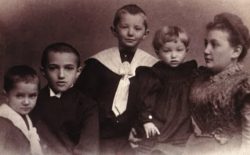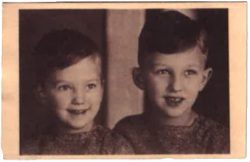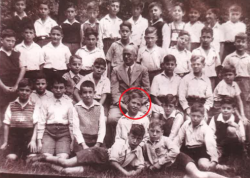The following text is an excerpt from the book “The Message” by Hans Wiener.
There is no specific documentation about my early family. My ancestors most likely came from Spain. Under the rule of King Ferdinand and Queen Isabelle all Jews and infidels either had to convert to Christianity or were expelled. From Spain many Jews immigrated to Galicia, a eastern region surrounded by Russia, Poland, Austria and Prussia.

From left to right, Hans’ uncles Fritz, Erich and Kurt, together with his father Franz and grandmother Jenny
My grandparents and my parents families, living in Germany for centuries, had like most people been ruined in the wake of the chaos following the lost war. My father Franz Wiener was born 1895 in Liegnitz and 1901 my mother Käte Eckstein was born in Breslau. Belonging to an almost completely assimilated Jewish society, father Franz, mother Käte, my two year elder brother Günter and I, lived in Breslau, a town about 300 km south-east of Berlin.
My father and his brothers Kurt, Fritz and Erich as well as my mother’s brothers Erwin, Ludwig, Walter and Fritz served in the German Army in the First World War.
Our families looked, behaved and felt like ordinary Germans. We ignored Jewish habits, holidays and religious services; we as children did not know them at all. We were not informed about our Jewish origin and had no awareness thereof. Our parents considered their Jewish religion being a totally irrelevant and ignorable attribute to which they had to pay no attention whatsoever. Sure, there was Anti-Semitism, communism and as usual all kinds of fanatics and extremism, but nobody took that seriously.
1924 – 1933
That year, July 14th I was born, absolute inflation struck Germany with devastating consequences.

Hans and his brother Günter
My parents, being young, bright and energetic decided 1926 to move our family to Berlin. I have no memories from my early childhood. I have been told that when I was six years old in 1930 I entered primary school in Berlin, and that I learned to swim that same year when I at summer vacation stayed with my uncle Kurt Wiener in Breslau.
1933, the German democratic Republic legally appointed the radically anti-Semitic leader of the National-Socialist Party, Adolf Hitler as chancellor. Hitler immediately overturned the democratic constitution into authoritarian dictatorship with drastic consequences. All other parties were eliminated and racial laws were implemented.
My family, law abiding citizens, living in Berlin did not consider the situation being very serious as political changes were ordinary events occurring. There were however immediate effects for many individuals and groups of society.
“Picture in Stone”, memorial picture at Wiener Heritage Center in Jerusalem
My uncle Kurt Wiener was a medicine doctor, and doing university research on Röntgen-Therapi and dermatology. He had several books published. After the discriminating legislation of 1933 as Jewish physicist he was no longer permitted to perform his profession. Subsequently he was unable to support his family and they emigrated to the United States of America.
They could take along a few of their belongings, among other objects a few family documents, which then luckily survived destruction during the Holocaust and were later forwarded to me by his family.
1935 – 1938
Laws were implemented which did not allow Jewish children to attend German schools. There were only few Jewish schools, but many, many Jewish teachers who had been forced to leave state-employment without notice.

School picture from the Jewish school at the Grosse Hamburger Strasse in Berlin, with Hans Wiener in the middle
I was forced to change to one of the few Jewish schools in Berlin at the “Grosse Hamburger” street, quite a distance from home. In the winter I took the train, and in the summer I enjoyed the trip with my bicycle. Once I fainted in the heat, crushed into a car and was brought home by strangers.
In 1938 it became obvious that there was little hope of any improvement in the conditions for German Jewry. November 9th 1938, came the “Kristallnacht”, so called after most Jewish shop windows were shattered, the interior looted and all German synagogues set afire. I was 13 then, working as an errand-boy in a Jewish fashion-shop on Kurfürstendamm in central Berlin, when the shop windows were broken and goods looted. The whole situation was so strange, traumatic and unreal. I cannot remember any details. I suppose I went home on my bicycle to tell my mother what had happened.
For a patriotic citizen like my father, who had served in the German army in the First World War, it must have been incredible to witness the sanctioning of such criminal activities by officials of a democratic government in one of the most advanced Central European countries. It must have been a terrifying experience for him to be deprived of his civil rights, his means of existence and robbed of all his limited material possessions.
1939
My parents decided to emigrate in 1938, when the “Final solution of the Jew problem” was in progress and most foreign countries had been closed for Jewish emigrants.
My parents would choose to cross the border illegally to France. Father would go first, alone to stake out the route and prepare accommodation. In the meantime, mother would prepare for our safety. My elder brother Günter had been able to obtain a transit visa to England with the further destination Palestine.

Hans’ mother Käte, 1927
Mother was reluctant, however, to expose my 3-year old sister and me to the unpredictable consequences of an illegal border crossing. Eventually mother was able to arrange the escape of my sister and myself to Sweden, through the “Kindertransport”. Of course everyone was sure that this arrangement was only for a short period, feeling certain that we all would soon again be together.
By the end of April 1939 when I was fourteen and my sister Marion was three, our mother packed a minimal suitcase with one set of clothing for each of us and gave me 20 Reichsmarks, all that we were allowed to take out of Germany.
We left our home at Johan Georgstrasse 20, Berlin Halensee, and took a streetcar to Anhalter Bahnhof, a northern train station in Berlin. There mother left us to a young Jewish official, who would accompany us on the train to Sassnitz, and on to the ferry to Sweden.
“Kindertransport” saved around 500 Jewish children to Sweden and 10 000 to England.
